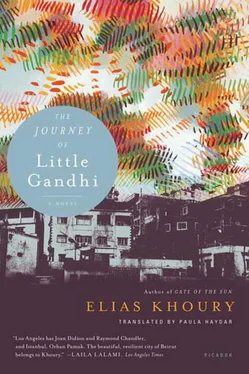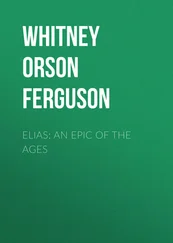Alice didn’t sleep that night. She was waiting for dawn, but it didn’t come. She wanted to sleep with a man, but this man had fallen into a deep sleep. Alice dozed off without realizing it, and when she woke up, she found the same darkness. She got up and tried to open the door, but it was locked with a key. She tried to open the curtains, but they wouldn’t open. She went back to the bed and fell asleep again. After a while, she didn’t remember how long, the door opened and the man from the day before came in with a battery-powered lamp. He asked her to get dressed and follow him. She got dressed and followed. He took her through endless corridors. The day before she hadn’t noticed these corridors, maybe because she’d drunk so much champagne, and today she didn’t notice when the dark man had left her, maybe because she’d fallen asleep. When they reached the door, the man gave her an envelope full of money and told her the driver would take her to the hotel, and things were set for tomorrow. When Alice got to the hotel, Abu Jamil didn’t dare ask her anything or ask for his cut. The agreement was that she’d pay him fifty percent of the tips. She went to her room and slept until evening. The next day, the same story; three weeks, and every day, the same story.
The last day, when the man with no features was half asleep, Alice sat on the bed and said she was leaving the next day. She thought she heard the word fine , in a Syrian accent, come out of his mouth, but she wasn’t sure whether it was he who was talking or a dog barking outside. He said only one word, and that night he pinched her a lot, until her body was covered with bruises, causing her to have to stay home from work for a whole week when she got back to Beirut.
When that dark man left, all memory of him went along with him. Alice forgot him and went back to work at Mirabelle. She’d spot Lieutenant Tannous on the other side of the cabaret, not daring to go near her. She’d smile at him and he’d leave, then she’d go back to listening to people’s stories and being shocked by these tragedies hidden deep within their paunches.
Two years later, Abu Jamil came to offer her the same opportunity: Mosul. Alice hesitated a lot, while Abu Jamil rubbed his hands and went on about how the door of opportunity was open and the man never stopped asking for her. Alice hesitated, remembering that frightful darkness in Mosul. She remembered being afraid, and how the man used to climb her as if she were a tree, not a woman. But she went anyway. And once again, for a whole month, she was enveloped by an endless darkness, from which she didn’t know how she escaped.
That’s how things are.
“The horses were green,” Gandhi said.
Little Gandhi was unable to forget the green horses. They trampled over men’s backs, and the men moaned. It was called al-Mashayikh Thursday. And there was the child who could see from only one eye; he’d wander among the men’s feet, trying to see. The horses would appear between the men’s feet, green in color. Little Gandhi had never seen green horses anywhere except on al-Mashayikh Thursday. When he asked the Reverend Amin about them, he laughed and patted his back. “You are naive,” he said, and then something from the Bible about those who inherit the earth. “Blessed are the meek, for they shall inherit the earth.”
“What do you mean by blessed, Reverend?” Gandhi asked.
“Blessed means how lucky they are. How lucky you are, Gandhi, because you saw the green horse. No one but John the Baptist has ever seen that horse.”
“Send my best to John the Baptist, Your Highness.”
The green horses flowed between their feet while the men lay prostrate and the sheikh mumbled and moaned. He sat alone on a high bench, the scene taking place all around him. A man rose up from under the horses’ hooves and ran toward the sheikh, kissed his hand, and wept. This is what Husn, the father of Abd al-Karim Gandhi, used to do. He’d lie flat on the ground and the green horses would trample over his back, then he’d get up, crying, and go toward the sheikh. The tears would stay in his eyes for three days, hanging from his eyes like small drops of crystal, swaying between his eyelids without falling. When the man died and Gandhi came to the village and entered the room where he was laid down, wrapped in white shrouds, he didn’t see the tears in his eyes. They were closed, and black, like two small stones. That day Gandhi wept. He didn’t know where his love for this man who had wanted to kill him in the cave had come from. All of a sudden, he felt this man was his father, that it had been a stranger in Mashta Hasan.
After the funeral, his cousin took him aside and talked to him about Fawziyya. This cousin, who lived in Tripoli, said he’d waited a long time for him to come and that the girl must get married, and that he’s more entitled to marrying her than anyone else.
Gandhi nodded his head in agreement, and his uncle took his right hand and said, “Let’s read al-Fatiha. ” 7They read al-Fatiha and a month later, when Gandhi returned to the village to be married, his father’s wife, the one with the black hair, that gypsy who’d sent him to the cave, told him that he could live in the house. But he didn’t want to. All he wanted was to finish with the wedding quickly and get back to Beirut. The wedding took place with the least possible expense — lemonade and sugar and a single ululation from his father’s wife. He took Fawziyya and went back to Beirut, and from that day on he never returned to the village. Well, no, he did go back to Mashta Hasan for Suad’s sake. They’d told him the sheikh could cure her. Gandhi went to him with his young daughter and her confused eyes, scrawny body, and her broken speech. The sheikh sat her down in front of him in a dark room, full of the smell of incense and the sound of mysterious words. The sheikh asked for fifty liras and gave Gandhi an amulet, but his daughter didn’t get any better. Actually, her state worsened, and if not for God’s mercy, they’d have killed her.
“The crazy girl ran away to Nabaa by herself.” Gandhi said this was God’s mercy; if it hadn’t been for that mercy, she’d have gone and died in her shame. “The medicine was no longer available,” Gandhi told Alice. “She became, I don’t know how, she’d walk around and bang on the walls, and then she just disappeared. I said to myself, it’s all over for you, Gandhi. The girl won’t be crazy anymore, but she’ll die. If they haven’t killed her, you will.”
Gandhi didn’t kill his daughter. Suad came back three days later looking exactly the same, as though nothing had happened. Maybe if they’d raped her she’d have gotten better, Gandhi thought. She came back home as though she’d never left. Only she stuttered a little more and spoke incomprehensibly.
“She speaks like a lunatic, come and hear her,” Gandhi said to Ralph.
Ralph wasn’t interested. He’d come home tired. He sat next to his sister and listened to her, then started laughing. The young girl told her story to everyone, but no one understood a word. Was it true they took her to a garage and tried to rape her, but one of them started vomiting and trembling, so they left her and ran away? Or is the real story that Tino, that was the leader’s nickname, it seems, Tino told them to leave her alone because she was crazy and she’d give them God only knows what kinds of diseases? Or was it that Michalany, “what the heck is his name — the one who saved me — Shali, yes, Shali,” was it Shali or Michalany who started banging his head against the wall and shouting, “Leave her alone, I won’t allow it, I …” and took her out of the garage and brought her to Museum Square?
No one really knew what happened to the girl when she fled to their old house in Nabaa, in East Beirut, and came back the same way she left.
Читать дальше












